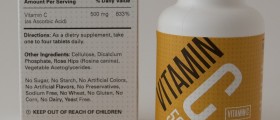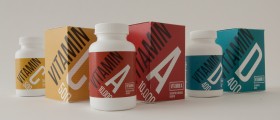
Vitamin B9 (Folic Acid)
Vitamin B9, which is also known as folic acid, is soluble in water, and a member of the B vitamin family. This vitamin is easily destroyed during the cooking and should be taken from foods that aren't heat treated. Also, like other vitamins that are soluble in water, the body cannot store it so it must be consumed constantly.Folic acid plays an important role in the metabolism of fats, proteins and carbohydrates and the conversion of energy that body requires. Vitamin B9 is essential in the formation of DNA and other nucleic acids. This vitamin stimulates the body's ability to manufacture red blood cells, and also has a major role in the fight against the amino acid - homocysteine. Folic acid helps in the production of the pigment (part of the red blood cell) that is responsible for the transport of iron through the body.
Folic acid also plays a major role in restoring the damaged tissue. It performs an important role in the production of serotonin - the neurotransmitter responsible for regulating sleep, mood and appetite. It is also known by the fact that it can help in the fight against cervical cancer.
All women who plan a pregnancy should bring sufficient amounts of folic acid. Its presence will help in proper development of fetus and its protection.
Sources of Folic Acid
Vegetables such as lettuce, peas, Brussels sprouts, spinach, kale, beans, tomato and asparagus, are a very good sources of folic acid.The animal's organs such as liver and kidneys also contain sufficient amounts of vitamin B9. Also, folic acid is present in tuna, oysters, shellfish, salmon poultry and pork.
Nuts (walnuts, peanuts), whole grain cereals, wheat germ, broad bean, fruits (lemon, orange, banana, melon), and fruit juices are also good sources of vitamin 9.
Finally, there is plenty of folic acid in milk, yolk and yeast.
Although excessive intake of folic acid is not dangerous, you should take care about quantities that entered the body. 300 micrograms of folic acid is recommended for women, while the men's daily intake should be 330 micrograms. Pregnant women, especially in the early stages of pregnancy, and women who want to become pregnant should take 400-600 micrograms of folic acid per day.
Symptoms of Folic Acid Deficiency
Inadequate intake of folic acid is probably the most common vitamin deficiency. The most risky groups include the elderly, pregnant women, women who use birth control pills and people who consume excessive amounts of alcohol.Depression, apathy, fatigue, dizziness and anemia can be caused by a lack of vitamin B9. Problems with memory, brain damaging and nervous system can also be caused by lack of folic acid.

















Your thoughts on this
Loading...